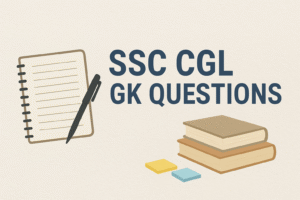Simon Commission
The Simon Commission, officially known as the Indian Statutory Commission, played a significant role in India’s struggle for independence. Constituted in 1927 by the British government, it aimed to review the workings of the Government of India Act, 1919. However, it faced strong opposition as it lacked any Indian representation, leading to widespread protests and the iconic slogan, “Simon Go Back.” This set of 30 Multiple Choice Questions (MCQs) on the Simon Commission covers its formation, objectives, opposition, and impact, helping students and history enthusiasts deepen their understanding of this crucial chapter in Indian history.
Question 1: The Simon Commission was officially known as the ________.
A. Statutory Commission
B. Constitutional Commission
C. Reform Commission
D. Government of India Commission
Show Answer
Answer: A. Statutory Commission
Question 2: The Simon Commission was set up by the British government to ________.
A. Recommend reforms in the Indian army
B. Suggest constitutional reforms in India
C. Investigate economic conditions in India
D. Study Indian education policies
Show Answer
Answer: B. Suggest constitutional reforms in India
Question 3: Why was the Simon Commission boycotted in India?
A. It included no Indian members
B. It demanded complete independence
C. It proposed dividing India
D. It was supported by the British Parliament
Show Answer
Answer: A. It included no Indian members
Question 4: Who was the chairman of the Simon Commission?
A. Lord Irwin
B. Clement Attlee
C. Sir John Simon
D. Lord Reading
Show Answer
Answer: C. Sir John Simon
Question 5: In which year did the Simon Commission arrive in India?
A. 1927
B. 1928
C. 1929
D. 1930
Show Answer
Answer: B. 1928
Question 6: The slogan “Simon Go Back” was first raised during the commission’s visit to which city?
A. Bombay
B. Lahore
C. Calcutta
D. Madras
Show Answer
Answer: A. Bombay
Question 7: Which political party led the protests against the Simon Commission?
A. The Indian National Congress
B. The Muslim League
C. The Swaraj Party
D. The Hindu Mahasabha
Show Answer
Answer: A. The Indian National Congress
Question 8: Who among the following was severely injured during protests against the Simon Commission and later succumbed to his injuries?
A. Lala Lajpat Rai
B. Bhagat Singh
C. Subhas Chandra Bose
D. Jawaharlal Nehru
Show Answer
Answer: A. Lala Lajpat Rai
Question 9: Which Indian leader called the Simon Commission a “wholly white commission”?
A. Mahatma Gandhi
B. Motilal Nehru
C. Jawaharlal Nehru
D. Bal Gangadhar Tilak
Show Answer
Answer: B. Motilal Nehru
Question 10: Which report was drafted as a response to the Simon Commission?
A. Nehru Report
B. Cripps Mission Report
C. August Offer
D. Cabinet Mission Plan
Show Answer
Answer: A. Nehru Report
Question 11: The Simon Commission primarily aimed to review the working of which act?
A. Indian Councils Act, 1892
B. Indian Councils Act, 1909
C. Government of India Act, 1919
D. Government of India Act, 1935
Show Answer
Answer: C. Government of India Act, 1919
Question 12: In which city did Lala Lajpat Rai suffer injuries during a protest against the Simon Commission?
A. Delhi
B. Lahore
C. Amritsar
D. Kanpur
Show Answer
Answer: B. Lahore
Question 13: Who was the Viceroy of India when the Simon Commission was formed?
A. Lord Reading
B. Lord Irwin
C. Lord Chelmsford
D. Lord Mountbatten
Show Answer
Answer: A. Lord Reading
Question 14: Which revolutionary group considered protests against the Simon Commission a spark for their movement?
A. Hindustan Socialist Republican Association
B. Anushilan Samiti
C. Indian National Army
D. Ghadar Party
Show Answer
Answer: A. Hindustan Socialist Republican Association
Question 15: The Simon Commission’s recommendations eventually led to the drafting of which act?
A. Government of India Act, 1935
B. Indian Independence Act, 1947
C. Government of India Act, 1919
D. Regulating Act, 1773
Show Answer
Answer: A. Government of India Act, 1935
Question 16: In response to the Simon Commission, an all-parties conference was held in which year?
A. 1927
B. 1928
C. 1929
D. 1930
Show Answer
Answer: B. 1928
Question 17: The Simon Commission recommendations ultimately contributed to which constitutional development?
A. Dominion Status for India
B. Provincial Autonomy under the Government of India Act, 1935
C. Complete Independence
D. Partition of India
Show Answer
Answer: B. Provincial Autonomy under the Government of India Act, 1935
Question 18: How many members were part of the Simon Commission?
A. 5
B. 7
C. 9
D. 11
Show Answer
Answer: B. 7
Question 19: Who among the following groups supported the Simon Commission?
A. Muslim League
B. Indian National Congress
C. Hindu Mahasabha
D. Swaraj Party
Show Answer
Answer: A. Muslim League
Question 20: The Simon Commission submitted its report in which year?
A. 1929
B. 1930
C. 1931
D. 1932
Show Answer
Answer: B. 1930
Question 21: The Simon Commission’s report proposed the abolition of ________.
A. Separate electorates
B. Dyarchy in provinces
C. Federal structure
D. Reserved seats for minorities
Show Answer
Answer: B. Dyarchy in provinces
Question 22: Which prominent leader described the Simon Commission’s recommendations as “disappointing”?
A. Mahatma Gandhi
B. Jawaharlal Nehru
C. Dr. B.R. Ambedkar
D. Subhas Chandra Bose
Show Answer
Answer: C. Dr. B.R. Ambedkar
Question 23: Which British political party was primarily responsible for creating the Simon Commission?
A. Labour Party
B. Conservative Party
C. Liberal Party
D. Independent Group
Show Answer
Answer: B. Conservative Party
Question 24: Who among the following termed the Simon Commission as “an insult to self-respect”?
A. Subhas Chandra Bose
B. Jawaharlal Nehru
C. Mahatma Gandhi
D. Motilal Nehru
Show Answer
Answer: C. Mahatma Gandhi
Question 25: The death of Lala Lajpat Rai was attributed to injuries caused by which British officer?
A. James Scott
B. Reginald Dyer
C. John Simon
D. Stanley Baldwin
Show Answer
Answer: A. James Scott
Question 26: What was the main recommendation of the Simon Commission regarding the Indian constitution?
A. Complete Independence
B. Federal Government with autonomy for provinces
C. Dominion Status
D. Retention of dyarchy
Show Answer
Answer: B. Federal Government with autonomy for provinces
Question 27: Which leader formed the Nehru Committee to counter the Simon Commission?
A. Mahatma Gandhi
B. Subhas Chandra Bose
C. Jawaharlal Nehru
D. Motilal Nehru
Show Answer
Answer: D. Motilal Nehru
Question 28: Which of these recommendations was included in the Simon Commission report?
A. Complete separation of Burma from India
B. Independence for India
C. Abolition of all princely states
D. Retention of dyarchy in all provinces
Show Answer
Answer: A. Complete separation of Burma from India
Question 29: The Simon Commission was a precursor to which major event in Indian constitutional development?
A. First Round Table Conference
B. Cripps Mission
C. Quit India Movement
D. Cabinet Mission Plan
Show Answer
Answer: A. First Round Table Conference
Question 30: The Simon Commission is considered significant because it exposed the ________.
A. Divisions in the Indian National Congress
B. Unity of Indians against British policies
C. Incompetence of Indian leaders
D. Support for British rule in India
Show Answer
Answer: B. Unity of Indians against British policies
The Simon Commission remains a pivotal event in India’s freedom movement, showcasing the unity of Indians against discriminatory British policies. The protests against the commission fuelled nationalist sentiments and paved the way for future constitutional reforms. These 30 MCQs provide an insightful way to grasp the significance of the Simon Commission, preparing you for competitive exams and historical studies alike. Stay tuned for more such MCQs on important events in Indian history.
Other MCQs –
Tropic of Cancer | 50 Important MCQs with Answers
Important MCQs on Battle of Plassey | Key Historical Questions





